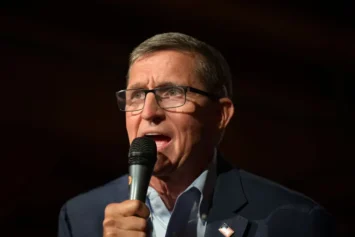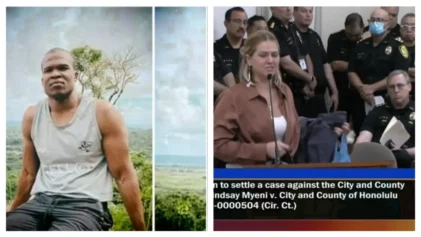By Kim Dankoor
The African Union is a continental body that consists of all of the 55 African nations, and its mission can be described as overcoming the greatest weapon that colonial powers have used against Black people: the strategy of divide and conquer. The AU’s ambassador to the United States and the Caribbean, Dr. Arikana Chihombori-Quao, states that people of African descent have become the most disrespected people on earth because their voices are missing in action and there is a deficit of cooperation and trust among this group. She further says that other ethnic groups stick together like super-glue. “To gain respect we have to come together and speak with one voice. Are you really willing to leave this world the way it is for your grandchildren?” she asks the African diaspora.
Before her appointment as AU ambassador, the Zimbabwe native, who immigrated to the United States in 1977, was a family medicine doctor in Murfreesboro, Tennessee, and with her fellow physician husband founded a chain of medical clinics in the region.
One of Chihombori-Quao’s mandates is to improve diplomatic ties with the U.S. and the Caribbean — although the AU maintains full intergovernmental organization diplomatic status with United States — but the mission she truly is passionate about is mobilizing Black people and telling those who are living outside of Africa that the continent is their home too. Watching one of her African-American friends break down crying and explain to her that not knowing where she comes from is an everyday struggle compelled Chihombori-Quao even more to spread the word of unity and “diaspora returns.”
During the first-ever AU town hall in Atlanta, the AU ambassador, along with several leaders of African diaspora organizations, politicians, journalists and educators, discussed how the people from the African diaspora can come together. The town hall meeting, titled “400 Years: Breaking through the arrested development in AFRICAN-African Diaspora Relations” took place on April 23, 2019, in the Atlanta University Center Robert W. Woodruff Library. The attendees, most of them dressed in the beautiful colors of Africa, were excited to speak with the AU ambassador about Africa-related projects, and several business connections were made over food and conversations. With the guidance of moderator Kwabena Boateng and host Amirah Ansaar, the groundwork of a diaspora homecoming was further textured that evening.
Before the start of the AU town hall, Dr. Chihombori-Quao spoke with Atlanta Black Star about the state of Africa, AU’s initiatives to further develop the continent, building Wakandas, global relations and African descendants “taking the wheel.” Having built several medical clinics, an Africa House, and a cultural heritage hotel, Dr. Chihombori-Quao’s evident entrepreneurial DNA will accelerate the AU’s goals to (re)unite Black people.
Africa, wake up!
According to Chihombori-Quao, the continent of Africa was awake, put to sleep by colonizers, and now has to wake up again and go back to its greatness. She elaborates on the role the West played in blocking Africa’s development: “The seed of divide and conquer was sowed during the Berlin Conference, which was held from November 1884 to February 1885. The participating Western nations knew that if they chopped Africa into different countries, those small economies could never survive on their own and would be easy to destabilize. To put this in perspective for you, if this world was a boxing game would you put Lesotho, Gambia, Burundi or Congo in the same boxing ring as China?” the AU ambassador asked with a chuckle.
“Well, this is exactly what is happening nowadays. These small African countries have the same sovereignty as the big nations. So when it comes to trading and negotiating, these itty-bitty African countries are meant to go against ‘big boys,’ so we are getting killed, there is no parity there. The game is over before it even begins. The Berlin Conference was designated to see to it that Africa and all its children will forever be defeated and dominated.”
So how is the AU planning to “wake up” the African continent? An important initiative was taken in 2018. The AU brokered the African Continental Free Trade Area (AfCFTA) deal, which was then signed by 44 of the 55 African Union nations. “With this deal African countries can come together and become one negotiating power, just like the US and Europe. One Africa, one voice, one continent”, the AU ambassador says.
A new dawn: The AfCFTA deal and the AU passport
The AU ambassador explains how this will have huge positive economic implications for continental Africans: “Without the deal it is easier for small African countries to change their own currency into dollars, pounds or euros instead of changing it into a small currency from another tiny African country. Thus, a manufacturer or distributor of tiles in Egypt has to send its tiles to Italy, only for Africans to buy them at 20 to 30 times the cost to come back to Africa. Intra-African trade will drop prices on goods significantly.” Africa’s intra-continental trade made up 18 percent of total exports, while nations in Europe and Asia are at 69 percent and 59 percent, respectively.
“For the AfCFTA deal to succeed Africans need to be able to move freely around the continent”, Chihombori-Quao says. Therefore, the African Union passport is of high priority for the AU as well. People with this passport are exempt from having to obtain any visa for all 55 states in Africa. “Right now, they are working on who will get it first. The AU passport is already available for some heads of states, ambassadors and approved business people. I am on a mission to make sure that African locals, who want to contribute to the greatness of Africa, and help build several Wakandas, will get the AU passport as well,” the ambassador said.
A new thief in town? The case of external donations
In two decades, China has become Africa’s most important economic partner. Across trade, investment, infrastructure financing, and aid, no other country has such depth and breadth of engagement in Africa. But the Africa-China business relationship is not short on critics: Chinese locals wonder why their country spends billions on Africa while some of them are struggling to buy medicines or get a decent education; the West warns that African nations could be sinking into unsustainable debt, like the debts to Western and multilateral lenders in past decades that many African countries still bear; and citizens in Africa have complained that workers are not treated fairly by their Chinese employers. Some Western analysts and academics have even gone as far as contending that China has become the new face of colonialism on the African continent.
When the AU ambassador was asked about Western and Asian countries’ history of donating to Africa, she replied with: “They [the West] are quick in telling us to watch out for China, but let me keep it simple and real. You have the former colonizers who are stealing from Africa for centuries. Now there is a new thief in town. You want the old thief to warn me about the new thief?”
And although the AU ambassador states that Africans need to deal with their own problems, she doesn’t entirely dismiss China’s help and funding. “China may not have treated us well initially because it was going into these little African countries individually, but now, China is funding railroads, and is training thousands of Africans.“
She further explains: “During the last meeting between African heads of states and the Chinese president, the African leaders said that they want to work with China, but only when it treats Africa fairly. China is now adjusting and changing. The former colonizers are not changing. They will talk about a railroad for 20 years, but you will never see it, and when they do build one, it is just to benefit their causes. They were never there for the people. Their whole purpose is to under-develop Africa and keep it in a turmoil; that is the difference between China and some countries in the West.”
As of now, Europe is increasingly emulating China’s approach to Africa, focusing on trade, and on partnerships, not conflicts and charity. The European Commission President Jean-Claude Juncker has proposed a new alliance with Africa to deepen economic relations and boost investment and jobs, BBC reported.
African descendants from all over the world can take the driver’s seat
Chihombori-Quao came to Atlanta to strengthen the bonds between continental Africans and people from the African diaspora. Chances are likely that most town hall attendees already care about unifying the voices of Black people and have a relatively positive outlook on Africa. So, how will the AU ambassador reach African descendants who aren’t preoccupied with their “African ties” and view the continent as a corrupt state of affairs?
“It is important to tell those people that they shouldn’t believe what people have told them about Africa. Africa is the richest continent on earth, and the West only perpetuates the lie of ‘a poor and a corrupt Africa’ to keep us divided,” Chihombori-Quao says.
She continues by saying: “Black people outside Africa, particular descendants of slaves, are really lost because they don’t know where they come from. Last February, the African heads of states unanimously approved the decision to officially let the descendants of former African slaves, from all over the world, know that Africa is their home. They want people from the African diaspora to know that they, too, can take the driver’s seat when it comes to development and all projects African.”
Ghana has already taken the lead in welcoming African descendants with open arms. The country has declared 2019 as the Year of Return. During this yearlong event, Black people around the globe will reunite and their resilience and extraordinary achievements will be celebrated.


